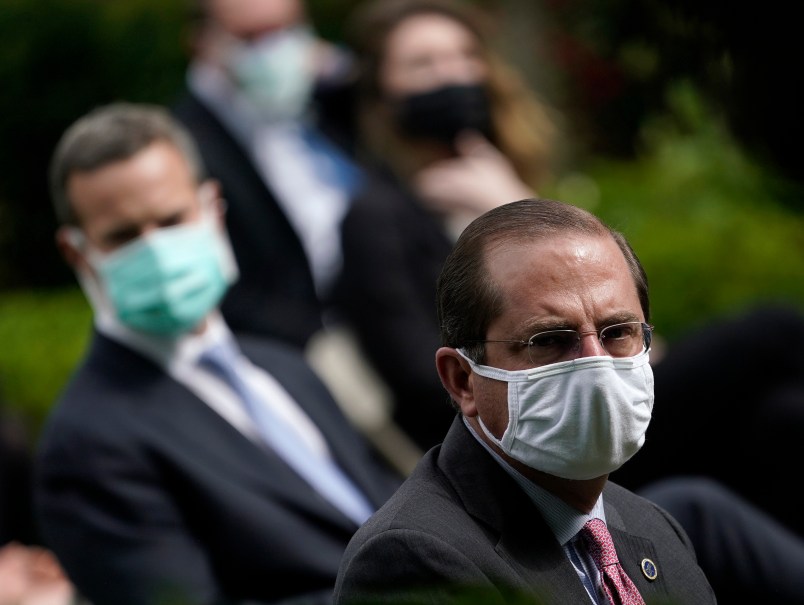More than a dozen states are now expecting far fewer doses of the Pfizer COVID-19 vaccine next week, with no explanation from the Trump administration for why the shipments have been cut.
It’s still not clear what has happened here. The Trump administration hasn’t offered a full account of why the shipments were cut, while Pfizer maintains that there are “millions more doses sitting in our warehouse,” waiting for orders for shipment.
The story blew up yesterday afternoon. But yesterday morning, after states had first been informed of the reduction but before it gained widespread attention, HHS Secretary Alex Azar burned Pfizer in a CNBC appearance, accusing the company of being opaque in its manufacturing processes and failing to get up to speed in time.
“We don’t have complete visibility into their manufacturing, because they’ve kept that a bit more arm’s length,” Azar said. “Now, I’d like to see that changed, I’d like to have a bit more visibility into that and we are willing to provide every tool the U.S. government has to assist them in maximizing their yields and increasing production capacity.”
Azar also said, without explanation, that Pfizer itself had cut the amount of doses that it originally committed it could deliver to the U.S. He said that Pfizer had first stated that it could produce 100 million vaccine doses by the end of the year, but that “they had to cut that in half to 50 million.”
Trump officials have promised to deliver 20 million Pfizer vaccine doses to the states before the end of the year. The wave of shipment reductions suggests that Operation Warp Speed may not meet that target.
Azar raised the topic following a question about why the Trump administration failed to order an additional 100 million doses from Pfizer before other countries did, placing additional U.S. deliveries beyond the initial 100 million until the summer.
“I do wish we would stop just talking about this Pfizer thing,” Azar complained. “We got 100 million from Pfizer through March 31 — about 20 million a month.”
He went on to complain about supposed problems in the pharmaceutical giant’s manufacturing system, and suggested that the U.S. would be able to receive more doses from the company before the summer. Azar, however, tied that to some sort of unspecified government action that would improve the company’s production lines.
“We’re very optimistic that we’ll secure additional quantities in the second quarter, but they’re gonna need help from us on their manufacturing,” Azar said.
Later on Thursday, Pfizer said the Trump administration had not yet given the company directions on where to ship doses of the vaccine that are in its warehouse, and Trump officials cast blame on the company for unspecified manufacturing deficiencies.
The confusion comes as the Trump administration has scrambled to coax Pfizer to ship more doses of its two-shot COVID-19 vaccine before the summer. The evening before Azar’s interview, the New York Times reported that the company could potentially ship more doses sooner if the Trump administration prioritized raw material supplies to the company.
Azar said in the Wednesday interview that he also wanted “more visibility” into Pfizer’s processes.
“We have a $2 billion commitment for those first 100 million doses, but they’ve kept things more arm’s length — at their insistence — throughout,” Azar said, before adding that he’d “like to have more visibility” into their production.
It’s not clear what that means. It’s also unclear why federal officials reportedly said that Pfizer is to blame for the reduced cadence in vaccine shipments over the next week.
Azar added that none of the manufacturing issues were related to the “proximate, immediate term of what Pfizer can deliver out of their manufacturing.”
“We’re maximizing that, we’ll help them obviously get higher yields if they’re willing to take our help, but this is all second quarter at this point that we’re talking about,” he added.
Azar reiterated in the interview, amid his somewhat veiled criticism of the pharmaceutical firm, that the “U.S. is getting its share and we’re obviously distributing their vaccine.”
“We’re having constructive discussions with them and seeing where we can get to on that,” he added.







Shorter Azar: “We fucked up entirely, but I see it’s almost Christmas, and I’ve only got four weeks left, so I’m just going to point fingers at other people until I’m gone anyway.”
I know it’s a crazy idea, but I think Azar is lying.
Obama’s fault. And Hillary’s…
It looks like their attempt to sabotage the Biden administration has come a few weeks early, probably due to their incompetence. And, it’s a poor idea to blame the people who are bringing the lifesaving vaccine for your faulty plan, that makes it more likely they will talk about how great it is to have the new sheriff in town who is easy to work with.
Five more weeks, we just have to make it five more weeks to have a government we can trust again.
And Jimmy Carter’s. If he hadn’t given the Panama Canal to the Chinese Communists, none of this would have happened!